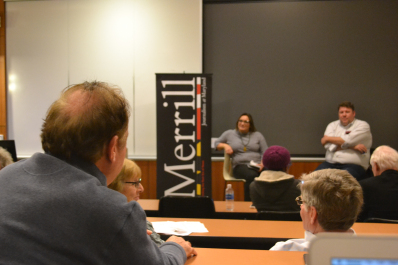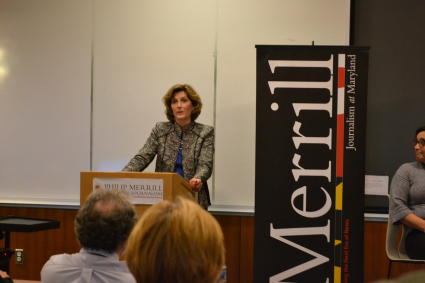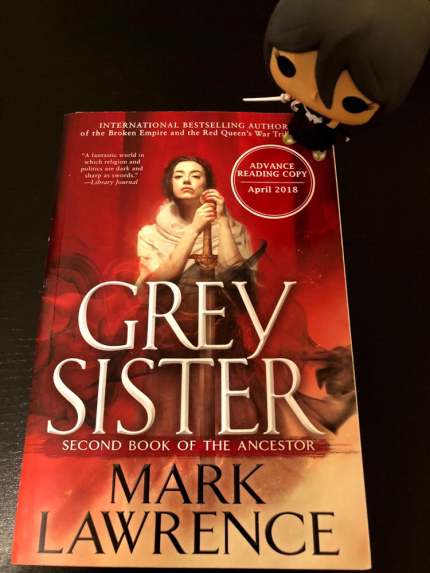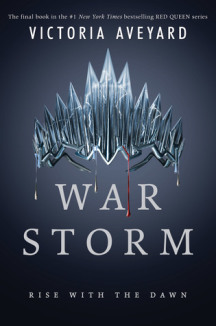By Ally Tobler
In October 2016, political journalist Jonathan Allen got a call from his editor at Crown Publishing Group.
“‘You’re writing a book about a candidate who’s losing, and she’s gonna win,’” said Allen, thinking back to what the editor had told him.
“There was silence on our end. We didn’t know what to say,” Allen recalled.
And according to Allen, that one observation is the epitome of Hillary Clinton’s campaign: the false belief held by many that she led the presidential race and the shock that ensued after she lost.
His New York Times No. 1 bestseller, “Shattered: Inside Hillary Clinton’s Doomed Campaign,” which was published during the April following the 2016 election, only stated the minute-by-minute details of her campaign, not that she was destined to win.
 Allen (GVPT ’98) listens to audience member questions regarding the Hillary Clinton campaign. Photo by Ally Tobler
Allen (GVPT ’98) listens to audience member questions regarding the Hillary Clinton campaign. Photo by Ally Tobler
“We take the reader through the moments as they’re happening in a way that sort of ignores what the outcome is, so you live through the highs and lows of the campaign as it’s going on,” he said.
Allen, who co-wrote the book with political journalist Amie Parnes, spoke at the event hosted by the Philip Merrill College of Journalism and the College of Behavioral and Social Sciences Nov. 29.
Margaret Talev (JOUR, ‘94), White House correspondent for Bloomberg News and president of the White House Correspondents’ Association, moderated the discussion.
“Did you have two sets of files for your notes?” Talev asked Allen. “An ‘if she won’ version, and an ‘if she lost’ version?”
Because the book was written during the campaign trail, Allen said he and and Parnes didn’t have a predetermined conclusion in mind.
“It was really just about reporting the story,” Allen replied. “There have been many times where I’ve written entire stories about someone winning an election and an entire story about someone losing an election, so that I can put the lead in and just hit ‘send.’ We didn’t do that with this. There was just one version, and it was either good or bad.”
Allen and Parnes said that because they reported the campaign as it happened, and without excluding facts that might support the idea of her winning or losing, the authors finished the book completely once the election ceased.
“The nice thing was that we didn’t have to go back and tear things up,” he said.
Despite their journalistic method of writing, Allen said he was still surprised at the election’s turnout.
 Philip Merrill College of Journalism Dean Lucy Dalglish kicks off the discussion on “Shattered: Inside Hillary Clinton’s Doomed Campaign”. Photo by Ally Tobler
Philip Merrill College of Journalism Dean Lucy Dalglish kicks off the discussion on “Shattered: Inside Hillary Clinton’s Doomed Campaign”. Photo by Ally Tobler
“Amie and I thought she was going to win too,” he said. “I don’t think there was a moment where we thought she was going to lose — until 10 o’clock on election night. There were moments where we thought it would go sideways potentially, but she seemed to be doing well enough.”
Their anticipation of Clinton’s success mirrored the outcomes forecasted by polls pre-election. According to Pew Research Center, opinion polls forecasted Clinton’s chance of winning at 70 to 99 percent, and that she would win Pennsylvania and Wisconsin — two of the states President Donald Trump ended up clinching.
“Shattered” analyzes the issues central to Clinton’s campaign deterioration: how she dealt with her personal email server, her failure to create a slogan competing with Trump’s “Make America Great Again,” her over-reliance on data and her failure to persuade groups beyond minority populations.
“Did she lose?” Talev asked. “Or did he win?”
“I think two things happened,” Allen said. “[Trump] delivered…by activating people who were upset about the economy, about the economic situation…she gave up on persuasion. Her campaign decided that it was much more efficient to find people that agreed with her and turn them out, than to try to persuade people to agree with her.”
Allen also shed light on the ways in which he said both candidates interacted with the media during their campaigns: Trump bypassed it, while Hilary had a “terrible relationship” with it, he said.
“[Allen] noted that it wasn’t the media that was to blame, it was the actual candidates — because they could influence the media however they wanted.” said Kylie McCabe, a sophomore whose major is undecided. “It was up to them to use the media to their own benefit, and one candidate did it better than the other.”
When freshman architecture major Blake Bissem read “Shattered,” he said he realized the divisiveness in Clinton’s campaign.
“Reading the book, it made her sound kind of clueless in some ways,” Bissem said. “It seemed like she wasn’t very aware of what was happening.”
Bissem said the most satisfying bit of information he heard from Allen’s talk was when he discussed why Trump was never held to the same standard as Clinton.
“I was always kind of confused as to why that was,” he said. “But when he said that she set a much higher bar for her behavior that she then failed to meet, that resonated with me. There are lots of other reasons too, but it seems like she didn’t live up to the standards that she set…for [Trump], there were no standards, so it didn’t matter.”
 Talev and Allen share a chuckle. Photo by Ally Tobler
Talev and Allen share a chuckle. Photo by Ally Tobler
Some members of the audience posed questions regarding Clinton’s future.
“She doesn’t want to exit the stage,” Allen said in response. “I think she wants to be involved in public policy…I think she has very strong feelings about the future of the Democratic Party.”
Allen informed the audience about his next book, which will be published post-2020 election.
“Look for it sometime early in 2021,” he said.
Share this:





